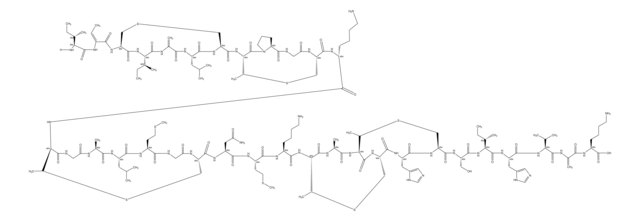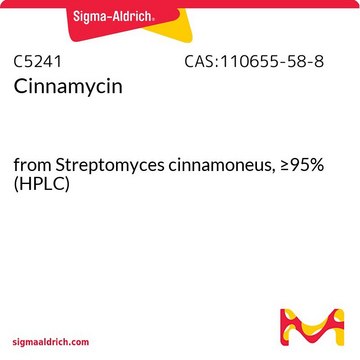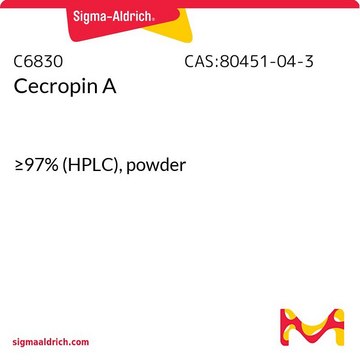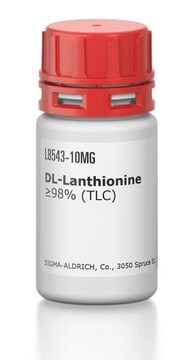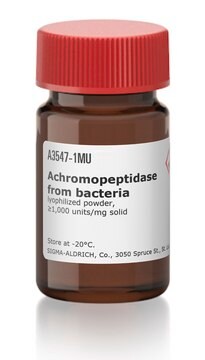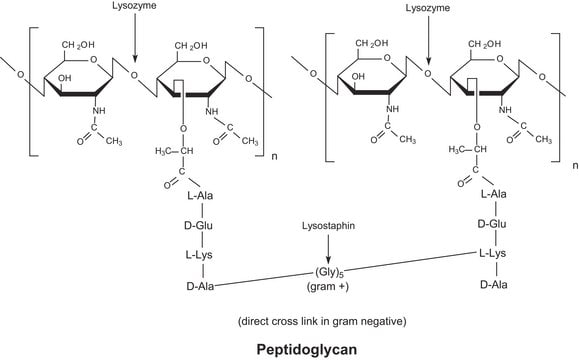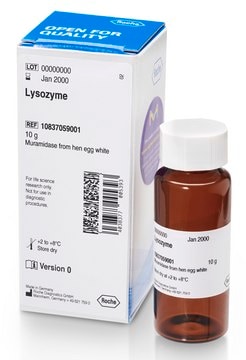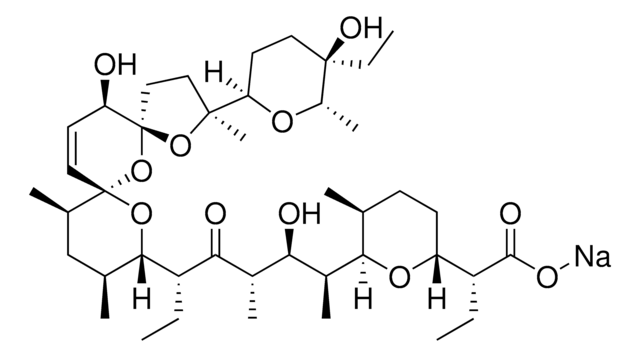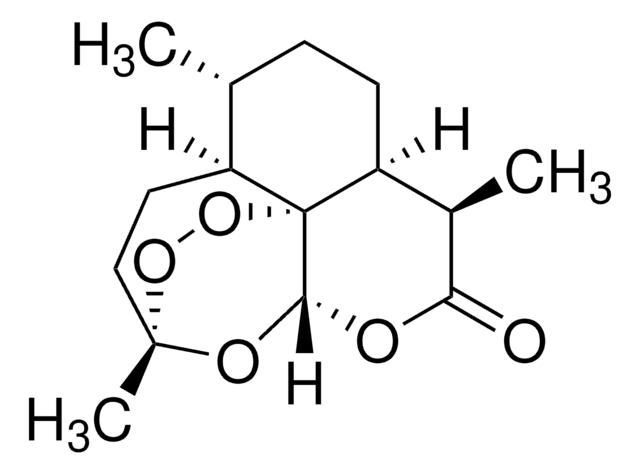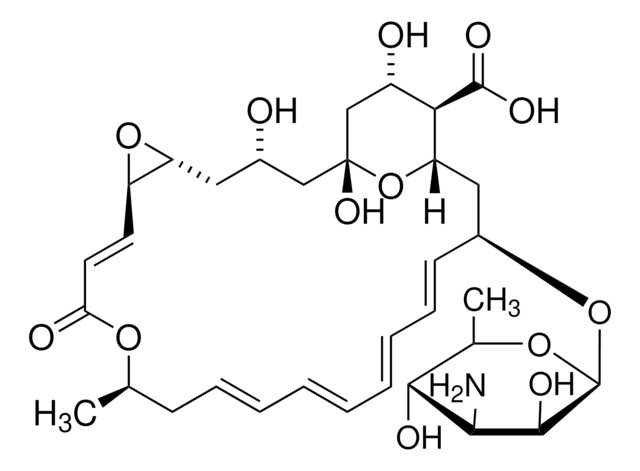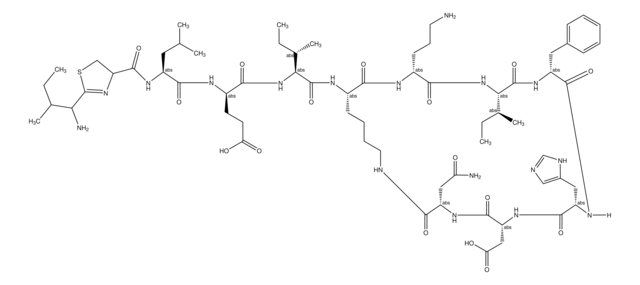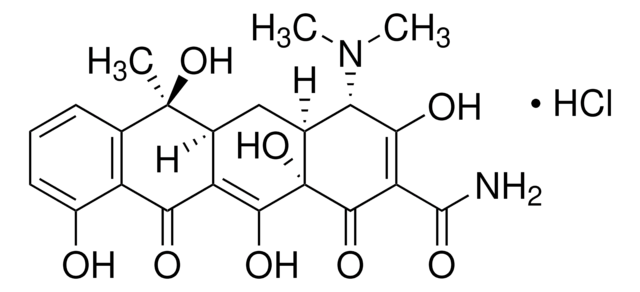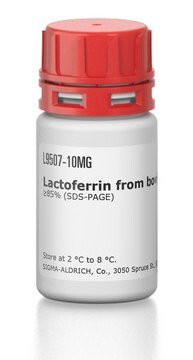SBR00021
Nisin Ready Made Solution
(20,000-40,000 IU/mL in 0.02N HCl)
Synonym(s):
Nisaplin
About This Item
Recommended Products
biological source
Lactococcus lactis
form
solution
concentration
(20,000-40,000 IU/mL in 0.02N HCl)
density
1.02 g/mL
antibiotic activity spectrum
Gram-positive bacteria
Mode of action
cell membrane | interferes
shipped in
dry ice
storage temp.
−20°C
SMILES string
O=C(N[C@H](C(NC(C(N[C@@H](CCCCN)C(O)=O)=O)=C)=O)C(C)C)[C@@H](NC([C@H]([C@@H](C)CC)NC([C@@H](NC([C@@H](NC([C@H](CC1=CN=CN1)NC2=O)=O)CS[C@H]([C@@H]3C(N[C@H]2CS[C@H]([C@@H](NC([C@@H](NC([C@@H](NC([C@@H](NC([C@@H](NC(CNC([C@@H](NC([C@@H](NC([C@@H](NC(CNC4=O)=
InChI
1S/C143H230N42O37S7/c1-24-69(11)105(148)135(213)162-82(27-4)118(196)174-94-58-225-59-95(175-123(201)89(48-67(7)8)169-115(193)74(16)158-138(216)107(70(12)25-2)180-132(94)210)133(211)184-112-79(21)229-61-96(160-104(190)56-152-134(212)100-38-34-44-185(100)142(112)220)128(206)164-84(36-29-32-42-145)120(198)182-109-76(18)226-60-97(161-103(189)55-151-117(195)85(39-45-223-22)165-122(200)88(47-66(5)6)168-113(191)72(14)156-102(188)54-153-136(109)214)129(207)171-92(51-101(147)187)125(203)166-86(40-46-224-23)119(197)163-83(35-28-31-41-144)121(199)183-110-77(19)228-63-99-130(208)170-90(49-80-52-149-64-154-80)124(202)176-98(62-227-78(20)111(141(219)177-99)181-116(194)75(17)159-140(110)218)131(209)173-93(57-186)127(205)179-108(71(13)26-3)139(217)172-91(50-81-53-150-65-155-81)126(204)178-106(68(9)10)137(215)157-73(15)114(192)167-87(143(221)222)37-30-33-43-146/h27,52-53,64-72,75-79,83-100,105-112,186H,15-16,24-26,28-51,54-63,144-146,148H2,1-14,17-23H3,(H2,147,187)(H,149,154)(H,150,155)(H,151,195)(H,152,212)(H,153,214)(H,156,188)(H,157,215)(H,158,216)(H,159,218)(H,160,190)(H,161,189)(H,162,213)(H,163,197)(H,164,206)(H,165,200)(H,166,203)(H,167,192)(H,168,191)(H,169,193)(H,170,208)(H,171,207)(H,172,217)(H,173,209)(H,174,196)(H,175,201)(H,176,202)(H,177,219)(H,178,204)(H,179,205)(H,180,210)(H,181,194)(H,182,198)(H,183,199)(H,184,211)(H,221,222)/b82-27-
InChI key
NVNLLIYOARQCIX-GSJOZIGCSA-N
Related Categories
Application
Biochem/physiol Actions
It was demonstrated that nisin has capability to inhibit the growth of almost all tested Gram-positive beer-spoilage bacteria. Of 122 Gram-positive bacteria strains (predominantly Lactobacilli and Pediococci), 93% were sensitive to 100 units of nisin. In contrast, out of the 32 Gram-negative strains tested, only the genus Flavobacter proved to be affected by nisin.
Nisin exerts its antimicrobial activity by binding to lipid II which is a membrane-bound advanced intermediate involved in the biosynthesis of bacterial cell wall. By doing so, nisin sequesters lipid II from its functional location. In addition, the nisin-lipid II complex leads to formation of pores in the membrane causing cell death.
Storage Class Code
12 - Non Combustible Liquids
WGK
WGK 1
Flash Point(F)
Not applicable
Flash Point(C)
Not applicable
Choose from one of the most recent versions:
Certificates of Analysis (COA)
Don't see the Right Version?
If you require a particular version, you can look up a specific certificate by the Lot or Batch number.
Already Own This Product?
Find documentation for the products that you have recently purchased in the Document Library.
Customers Also Viewed
Our team of scientists has experience in all areas of research including Life Science, Material Science, Chemical Synthesis, Chromatography, Analytical and many others.
Contact Technical Service